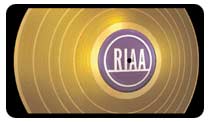The operative has a real job, outside the slings and arrows of outrageous music and shysty publishing houses, which gives him the economic and personal security to keep bustin’ fools out like he do. That job, doncha know, is as a “digital professional,” a web designer who spends 90% of his work day gazing into the iridescent glow of a Macintosh’s monitor.
The operative suggests you hang on, as jargon will begin to fly
Any digiterati worth his RAM has heard the hubbub about MP3 -- near CD quality music in a digital format, downloadable in reasonable time on anybody’s computer. Most people outside the computer world haven’t heard nor cared. Except your friends, and mine, Record Companies!
 At the root, all record companies -- from ones we like like Ruffhouse and No Limit, to ones we find deplorable like LaFace and Def Jam (modern, not classical) -- are towers of corporate greed and hypocrisy. Much like all magazines, but that’s another story. Some have better artists and product based on any number of factors -- idiot luck, actual decent people working there, or what have you -- but they all exist not for music, not for “love of the culture,” and sure as hell not for hip hop. They want money like a Moe Dee single.
At the root, all record companies -- from ones we like like Ruffhouse and No Limit, to ones we find deplorable like LaFace and Def Jam (modern, not classical) -- are towers of corporate greed and hypocrisy. Much like all magazines, but that’s another story. Some have better artists and product based on any number of factors -- idiot luck, actual decent people working there, or what have you -- but they all exist not for music, not for “love of the culture,” and sure as hell not for hip hop. They want money like a Moe Dee single.
When they caught wind of MP3, they started trippin’ like a one legged man in a field of ottomans. The artists, they claimed, the artists must get paid ... this is a travesty, blah blah blah.
However, some of those “artists” loved the idea. White acts were first to get in on the game, (the Beastie Boys are all over it, but you don’t see Capitol yellin’ at they ass) uploading early singles and live tracks online to generate interest in their albums. This was a big success. Then, Public Enemy’s Chuck D (who has a phat site up at http://www.publicenemy.com, holla at your operative, Chuck!) decides to post the first single from the Bring The Noise 2000 flav online.
The operative ducks the crack of a whip
Alas, Def Jam ain’t black owned any more. It’s a vassal fiefdom of Seagram’s, who owns Polygram, MCA, and a whole buncha other fools. Massa Seagram don’t like the idea of free music without him getting a cut (actually, Seagram’s top dawg is Ed Bronfman, but whatever), so they yell at the Rhyme Animal. The result -- PE signs with a Yay Area indie label Atomic Pop for primarily internet sales of the new joint, and Chuck kicks “Swindler’s Lust” against the vile barons of corporate wickedness.
Next? Ice T is approached by MP3 advocates, given his amusing woes at Massa Time Warner’s plantation, and he throws his next joint in the digital gumbo. Add their names to white likes of Sarah McLaughlin, the Beasties ... and you got somethin’ goin’ on.
 The RIAA (the Grammy and “your isht is platinum” people) and the big record companies began to fight it -- in the press and in the labs. They issued statement after statement saying they were working in the interests of artists getting fed and keeping roofs (rooves?) over their heads, stopping music pirates and comparing MP3 advocates to bootleggers. Then, they came up with a harder-to-play-n-swipe digital music format they can control.
The RIAA (the Grammy and “your isht is platinum” people) and the big record companies began to fight it -- in the press and in the labs. They issued statement after statement saying they were working in the interests of artists getting fed and keeping roofs (rooves?) over their heads, stopping music pirates and comparing MP3 advocates to bootleggers. Then, they came up with a harder-to-play-n-swipe digital music format they can control.
The operative somehow finds it hard to believe that people who charge 20% interest on artist advances suddenly are the big homies
 Decide for your self -- go to www.download.com and check out an MP3 player (mac peeps watch out, MacAMP is not OS 8.5.1 compatible yet, but you can rock with Quicktime). Bounce to MPEG.ORG, MP3.com, or Lycos to peep some sounds. If you got mad speakers on your joint like my man Ebow or Kyle, you can rock the house. Damage Control is down with breaking the industry’s stranglehold, so “go MP3, go digital!”
Decide for your self -- go to www.download.com and check out an MP3 player (mac peeps watch out, MacAMP is not OS 8.5.1 compatible yet, but you can rock with Quicktime). Bounce to MPEG.ORG, MP3.com, or Lycos to peep some sounds. If you got mad speakers on your joint like my man Ebow or Kyle, you can rock the house. Damage Control is down with breaking the industry’s stranglehold, so “go MP3, go digital!”
The operative quietly starts dubbing those stolen TLC CDs digitally to get his slang on
EDITOR'S NOTE: GrayAMP is now Damage Control's recommended Macintosh MP3 client application. The RIAA's MP3 format is laughed at and rarely seen. MP3.com went public to an all-time high stock price of somewhere in the 60s, and was in the 30s as of early November 1999. Life goes on.



